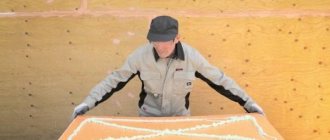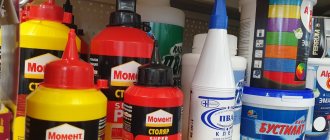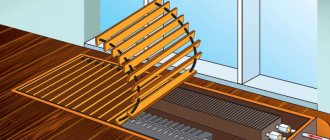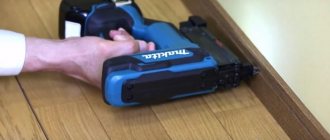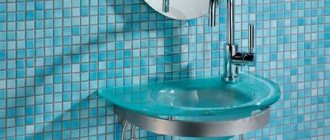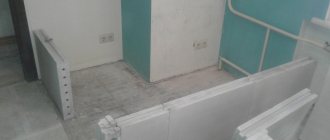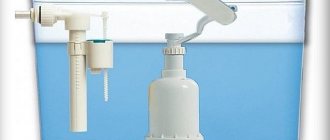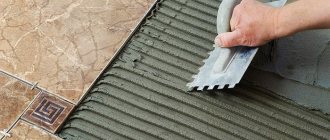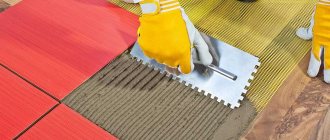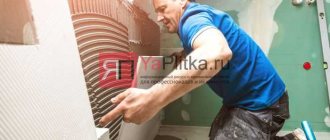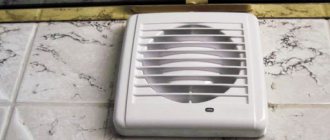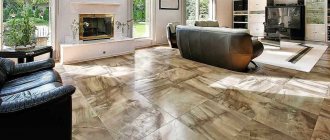- Characteristics of tile adhesive
- Classification of adhesive for porcelain tiles
- Tile adhesive for exterior finishing
- Tile adhesive for interior decoration
- Universal tile adhesive
- Moisture-resistant tile adhesive
- Reinforced tile adhesive
- Fast-curing tile adhesive
- What you need to know before buying
“The porcelain tile is capricious, doesn’t listen, and falls off.”
We sometimes encounter similar comments about one of the best finishing materials. Cersanit specialists decided to understand the reasons why porcelain tiles from time to time do not want to be friends with customers. It turned out that he was really guilty, just not of what he was accused of. It turned out that not every adhesive is suitable for installing a durable, rather heavy and practically non-moisture-absorbing material. Standard tile adhesive, mixed with water, is absorbed by the porous surface of a plastered wall or cement floor screed - this is how it is securely fixed to the surface. But moisture-resistant porcelain tiles do not have the ability to absorb substances: neither water nor glue. As a result, the slab simply peels off from the surface or, over time, begins to creak when walked.
Not everything is simple with compounds made specifically for the installation of porcelain tiles. They differ in adhesive ability, elasticity and have different coupling mechanisms. That is why the question of which adhesive is most suitable for porcelain tiles arises before everyone who has started a renovation and has already stocked up on material.
Characteristics of tile adhesive
The adhesive is selected based on the dimensions of the slab. The 30x60 cm and 22x90 cm formats are installed using specific adhesive compositions with different characteristics. In addition, the finishing area is important. Bathroom adhesive differs from external adhesive in a set of special additives.
Main characteristics of adhesives for porcelain stoneware:
- Frost resistance: this criterion is important when the material is laid outdoors and in unheated rooms; it allows the glue to withstand low temperatures when moving from plus to minus. To measure the adhesion force of the sample to the base, a sample of cement adhesive saturated with water is checked by cyclically passing through zero. According to GOST, all adhesive compositions above class C1 must withstand 25 cycles.
- Moisture resistance: in wet areas, both the finishing material and the adhesive on which it is mounted must be resistant to moisture. Otherwise, the finish will not last long.
- Deformability: surfaces subject to vibration (building facades, walls and floors) are finished with porcelain stoneware. Also on large-format tiles there is surface tension, which often affects the separation of the material from the base. Adhesive compositions with a high elasticity index - S1 - allow you to avoid tile peeling. They are recommended for facades, vibration loads, elevators, for formats with a slab side of more than 1 m. Adhesive compositions with elasticity index S2 are recommended for extra-large formats with a slab side of 1.5 m or more and/or for installation without grout joints.
- Degree of adhesion (adhesion): A property that ensures the strength of the connection of materials.
- Heat resistance: if porcelain stoneware is used to decorate stoves, fireplaces or is mounted on a heated floor system, its characteristics should not change due to exposure to heat.
According to GOST, the main characteristics of the glue have a letter designation:
The characteristics that you should pay attention to first of all are the degree of adhesion and deformability. All other indicators are variable and correlate with the type of room, type of porcelain stoneware and microclimate characteristics.
Manufacturers rating
To choose the best adhesive for porcelain tiles, it is useful to familiarize yourself with the brands and products available for sale. Taking into account reviews from specialists and consumers, a rating of manufacturers was compiled. Adhesive compositions for porcelain stoneware slabs are presented by foreign and domestic manufacturers.
The leaders in the rating in terms of product quality are manufacturers whose products are represented by the following brands:
Knauf; Ceresite; Bergauf; Unis; Litoflex; Mapei; Founds; Volma-ceramic;
Popular glue brands
Let's look at the main advantages and features of the products of the most popular manufacturers of adhesive mixtures for tiles.
KNAUF FLIESEN
Knauf products are very famous and have been the undisputed leader among manufacturers of adhesives for tiles and ceramic tiles for decades. Mixtures of this brand are best suited for 30x30 cm porcelain stoneware and its installation on indoor surfaces. The big advantage of Knauf Fliesen plus is its economical consumption; with a minimum layer thickness of 7 mm, it ensures strong fastening of the tiles to the base. Can be used on any texture and type of surface.
CERESIT CM 11
This is a universal mixture, very practical and easy to use. Ceresit CM 11 does not harden so quickly, which allows the tiles to be adjusted. A high level of adhesion ensures strong fastening of the slabs to the surface. The adhesive mixture of the Ceresit SM 12 brand is intended for large-sized porcelain stoneware slabs and is capable of holding a large weight of material. It has moisture resistance, high adhesion, and is widely used for installing porcelain stoneware on external surfaces. Also for cladding on the street side, the composition of the same brand Ceresit CM 117 is intended. If necessary, an elasticizer can be added to such mixtures, which allows installation on any complex surfaces.
BERGAUF CERAMIC
Mixtures of this brand are also well known and in demand on the finishing materials market. In this case, the Bergauf Ceramics adhesive composition is a special reinforced mixture. The properties of this composition are moisture resistance, ductility and high strength. Using this glue, you can finish in rooms with high humidity, and its plasticity allows you to work with the finished solution in any conditions. Finishing specialists confidently recommend tile mixtures of this brand.
UNIS GRANITE
For external work on the facade side, when it is necessary to lay large slabs, Yunis Granite is best suited. For indoor work, this mixture can be used if you need to lay porcelain tiles on heated floors. The finished solution does not change its qualities under the influence of high and low temperatures.
UNIS 2000
Just like Unis granite, this type of Unis 2000 adhesive is widely used in exterior finishing work. The mixture tolerates and does not lose its properties from temperature changes. Refers to the professional type of mixtures. The finished solution quickly sets on the surface, within 10 minutes, and retains its properties for only 3 hours. High performance characteristics and strength make it possible to lay porcelain tiles on any type of base and complex surfaces.
LITOFLEX K80
Professional mixture for installation of porcelain tiles. Very durable and resistant to high temperatures. Litoflex is used for laying slabs on heated floors and for outdoor work. Special properties and additives allow you to work on any surface.
VOLMA-CERAMIC
This brand is made in Russia. Domestic manufacturer of adhesives and various types of building mixtures. The big advantage is the low price with high quality tile adhesive. High adhesion, strength and frost resistance allow you to work and install at low temperatures.
The following brands of domestic manufacturers are also popular: Hercules, Prospectors, Osnovit Graniplix.
It is worth noting that the standard packaging is a 25 kg bag.
Classification of adhesive for porcelain tiles
There are many types of adhesives for porcelain tiles. They differ in composition, cost, scope and class. There are adhesives:
- Ready-made: do not require kneading and are quite expensive.
- One-component: mixed with water before application.
- Multicomponent: professional adhesives with additional properties.
Cement adhesive mixtures in Russia are divided into several classes according to GOST:
- Class C0 - appeared only in Russia; according to European standards, such a product is not considered tile adhesive. In the Russian Federation, such mixtures cannot be used for installing porcelain tiles, even if manufacturers write that they are moisture resistant. Using class C0 adhesive, ceramic tiles with a water absorption of at least 5% are laid in warm rooms. Often, on packages of class C0 glue, “POCKET GRANITE” is written in large print and in small print it is indicated that the glue can be used for installing porcelain tiles along with additives, but any changes in the composition of the mixture and its further use are at the buyer’s own risk. Porcelain tiles may simply fall off over time due to unsuitable glue.
- Class C1 cement mixture is an adhesive composition with an adhesion index of at least 0.5 MPa (MPa - megapascals. Pressure and mechanical stress are measured). In order to tear the slab off the wall, you need to apply a uniform force per 1 m2 equal to 500 kg. The adhesive is suitable for use indoors and outdoors, in humid environments and during temperature changes. The composition can remain open for 20 minutes.
- C2 is a cementitious adhesive with enhanced adhesion. It is used for installation of large-format or heavy porcelain tiles. This quality is invaluable when finishing vertical surfaces.
The international classification subdivides adhesives for porcelain tiles depending on their purpose:
- for exterior decoration;
- for interior work;
- for floor finishing (more liquid);
- universal;
- reinforced;
- moisture resistant;
- fast-hardening;
- elastic.
If you know all the parameters of the upcoming repair, you can select the tile adhesive yourself using the table:
Some tips on laying tiles from the experts
When laying wide-format tiles on floors, you need to make sure that the base is strong, since removing the slab and installing it again will not work.
6mm tiles can be safely laid on floors and walls if the manufacturer indicates that they are suitable for floor use. If the manufacturer indicates that the tiles are made only for use on the wall, then laying them on the floor is highly undesirable, even if the material is 10 mm or more thick.
Large formats must be laid by a team of at least two people, this is due to both the severity of the work and the complexity of installation. After applying the adhesive, the tiles become very heavy, and the installation time is quite limited after preparing the mortar.
Use professional equipment to transfer tiles and lay them; suction cups must be used with vacuum suction.
Measure twice, cut once, this saying also applies when cutting large-format material.
The cut must be made on a special cutting machine, removing the film from the surface, if any, and if you need to cut out a small part, then use a very thin cutter with a diamond coating.
When transferring, do not place the material on a hard surface; place a soft substrate of sufficient thickness, usually this thickness is equal to two cardboard boxes folded in half. This recommendation will help prevent the edge from chipping off the edge of the tile.
Fast-curing tile adhesive
Fast-curing adhesive
allows you to almost immediately fix the tiles to the surface. This glue is resistant to moisture, provides instant adhesion, is immune to temperature changes, but it does not forgive mistakes. Do not forget that the type of surface also determines the adhesion coefficient. The more complex the surface (plasterboard, plastic, metal, glass), the higher this indicator should be - from 1 MPa. For standard surfaces (concrete, brick, gas block) glue with 0.5 MPa will be sufficient.
Consumption rates per 1 m2
Adhesives for porcelain tiles are special compounds that have the properties necessary for the job. Their price is an order of magnitude higher than conventional tile mixtures, so in order to avoid unnecessary costs, it is necessary to accurately calculate the consumption of the finished solution.
Preparing the surface, which includes cleaning, leveling, eliminating all differences and priming, will help to avoid overuse of glue. The maximum difference should not exceed 3 mm. Horizontal floor surfaces are leveled with a regular screed using a mortar of sand and cement.
Level the solution using a comb spatula, which eliminates unevenness on the surface of the layer and allows it to be applied at the same thickness. The manufacturer's instructions indicate the recommended number and sizes of tool teeth for the job.
The consumption of adhesive for porcelain tiles per 1 m2 depends on the type of mixture and spatula. The average consumption of cement-based glue is 1-1.9 kg/m2. When applying the mixture with a comb, material consumption is greatly reduced. These data are indicated on the condition of a flat surface.
An approximate calculation of the required amount of glue can be made as follows: On average, 1.3 kg/m2 is consumed per 1 mm of the thickness of the adhesive layer. When laying tiles measuring 30x30 cm on a flat surface, the thickness of the adhesive layer will be 3.5-4 mm. Therefore, the consumption per 1 m2 of area will be 1.3x4 = 5.2 kg. The calculation for a surface with a total area of 25 m2 is made as follows: multiply 5.2x25 = 130 kg of glue. Having calculated the approximate consumption, you can purchase the required amount of the mixture, but always with a small margin.
What you need to know before buying
Let's summarize the most important points:
- Standard tile adhesive C0 or without class indication is not suitable for porcelain tiles.
- The larger the slab format, the higher the adhesion coefficient of the composition (adhesion) should be.
- For difficult environmental conditions and non-standard surfaces, a special adhesive is required, not lower than C1.
- Universal and reinforced adhesives are a marketing ploy; it is important to focus on the class of adhesive.
- For large-format slabs with a side of more than 1 m and for vibration loads, it is important to use adhesives of class S1 and higher.
- Quick-hardening compounds are difficult to use and do not forgive mistakes during installation.
Terms of use
It is better to prepare the solution in small portions. Do not add the entire specified volume of water at once; it should be done gradually. Procedure for diluting glue:
- pour water into the mixing container;
- introduce a portion of the dry mixture;
- mix thoroughly (preferably with a construction mixer);
- leave for 15 minutes;
- finally mix the solution, if necessary, adjust the ratio of water and dry powder (the finished mass should acquire the consistency of sour cream);
- use a product for laying porcelain tiles.
Apply glue to the tiles with a trowel or spatula. Most often, a trowel with 5 mm teeth is used, but for larger tiles you can use larger ones. You cannot walk on the laid floor for 2 days to allow the glue to finally adhere to the base. Working with porcelain tiles is possible even for beginners if you buy high-quality glue and follow all the tips for diluting it.
How to prepare the surface
Porcelain tile adhesive should be applied to a dry, hard, clean surface. It is necessary to remove traces of oils, soot, and small foreign particles.
If the base is glossy, then it must be sanded until matte. Surfaces with low moisture resistance must be thoroughly cleaned and washed.
To remove visible irregularities on the surface, you can use a grout or primer.
Advice! It is not recommended to level the base with glue. For these purposes, specialized compounds are used.
FAQ
Which spatula is best for applying the composition?
V-shaped tools use less solution than U-shaped spatulas.
What determines the thickness of the applied adhesive layer?
The thickness of the layer is determined by the declared characteristics of the composition, as well as based on the size of the tile fragments - the smaller the element, the thinner the adhesive coating required for it.
Does the level of moisture absorption of the tiles affect the consumption of the mortar?
A facing material with high absorbency will absorb some of the glue more strongly, which will require more mixture.
Do I need to level the wall before laying tiles?
Uneven surfaces will require additional glue consumption to fill them, and the risk of the finished cladding coming off the wall will also increase.
What is highly elastic adhesive used for?
Compositions with increased elasticity make it possible to cladding resonating bases from gypsum plasterboard or plywood, as well as lay tiles on problem surfaces that prevent the absorption of glue.
Correctly selected tile adhesive will allow you to complete tiling work quickly and efficiently, avoiding unnecessary costs for consumables, and keep the finishing result in its original condition for a long time.
Requirements for mixtures
Tile adhesive for porcelain tiles should have different properties under different conditions. To lay tiles on a warm floor you need an elastic adhesive. When tiling, the heated floor heating must be turned off and turned on only after the glue has completely dried. The packaging with the adhesive mixture must have a corresponding inscription.
When cladding the external walls of buildings, when paving sidewalks and paths, you should choose adhesive with the letter “F” on the package. The number next to it indicates the number of freezing and subsequent thawing that the glue can withstand.
Before using any adhesive, preparation of the substrate is especially important. It needs to be cleaned of old plaster, dust, grease stains, and old paint. Then the surface is leveled and primed. All these operations will be the key to the durability of the porcelain stoneware coating.
Weber Easy Fix
Volume : 25 kg.
Price : 275 rub.
If you are looking for high-quality and reliable glue when thinking about repairs, then you have found it! Weber Easy Fix shows excellent adhesion and ductility. Reliably adheres tiles and is suitable for small format porcelain tiles.
If there is a need to glue large-format tiles, then to enhance the effect and reliability, it is necessary to coat the wall and the back side of the tile with glue. This glue also has disadvantages - it is not suitable for heated floors. The glue mixes well, and all the lumps dissolve in the process.
